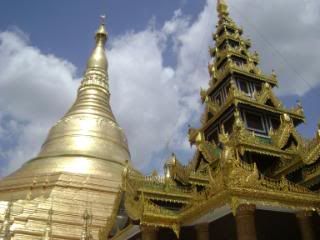
Even before Laura got the bad news, I had been apprehensive about going to Myanmar. The country has been run by a military dictatorship for 24 years (it was hard line socialist for 20 years before that). It is not a place you associate with "human rights" and "fun under the sun." Reading about it beforehand, it reminded me too much of places I had been to in Africa, places where you could get in serious trouble by taking pictures of, say, a bridge or an airport. Plus, I had lied on my visa application -- they don't let in journalists, and while I am no longer a reporter they wanted a job history, and I fibbed all over. But I flipped through our guidebook one last time that night and decided I would go for it -- I was only going for a week, and there seemed so much to see. So I was up at 3 a.m. for the 4 a.m. airport shuttle. It rained hard that morning, and I had a long wait in the airport. The small Air Asia plane was only half full, and I I talked to an Argentine woman. It was a bright sunny morning in Yangon; I shared a taxi from the airport with two Americans. I went to a cheap hotel. I was in Myanmar.
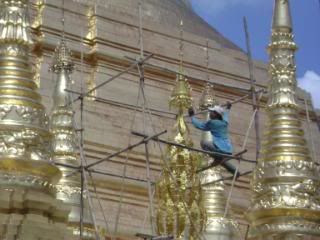
A day in Yangon convinced me I did not want to roam far and wide in Myanmar. Conditions are primitive and transport verges on diabolical. I had originally thought of heading to Bagan, Inle Lake and Mandalay. I decided instead to do a tight circle around Yangon; go slow, go easy, enjoy things. I met a German girl and an Irish guy, and the next day headed to Kinpun. That afternoon we took a bus to Golden Rock, a place Buddha visited and where later a hermit donated three of Gotama's hairs; the rock, painted gold, seems to hang on the edge of the abyss. The summit was full of monks and hermits. They moved on the next day but I stayed and wandered around the tiny town.
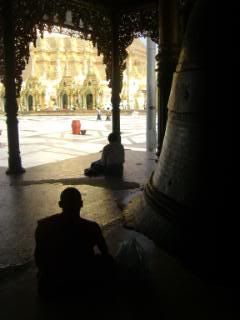
Later I went to Bago, and was met at the bustling bus station by a boy on a bike, who drove me to a hotel and offered to be a guide the next day. Early the next morning he knocked on my door. Bago is a small city home to sacred temples, massive reclining Buddhas and a temple home to a gargantuan snake said to be the reincarnation of the temple monk's mother.
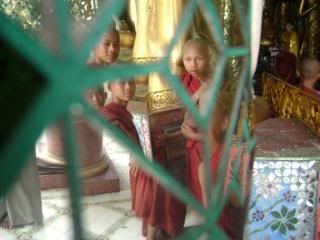
The next day it was back to Yangon, where I spent two days looking around the center of the city. By this time, as has happened to many other times on this trip, Myanmar was in the news (though not the domestic news, which is heavily censored, but from the number of police around you could figure out something was up): the nation's Nobel Prize winning democracy activist, already in jail in one form or another for two decades, had been arrested again. I kept a low profile.
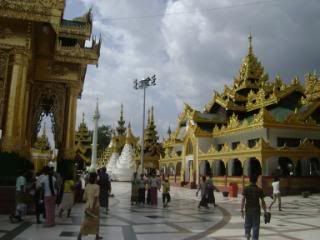
In traveling to Myanmar I became one of just a relative handful of vacationers to go there. This backwards country is not on the tourist trail: it's hard to get permission to visit, it's hard to get to, and once you are there it's hard to do just about everything. The government is openly hostile towards its people. Many travelers are justifiably reticent to go there because as a traveler you inevitably wind up paying taxes and giving money in one form or the other to the government -- money which is then used to oppress its already rather helpless citizens. (I tried to minimize this by using private transport, eating in private restaurants and staying in private guest houses.)
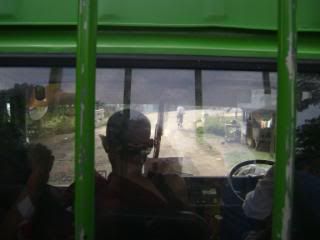
So what is life in Myanmar like? It's presumptuous of a tourist who has been in the country for a week to make such an estimation, but I think it's safe neverless to say that life for the vast majority of Myanmar residents is pretty damn shitty. You could say the economy is in a freefall, but that would suggest it can still go somewhere down.
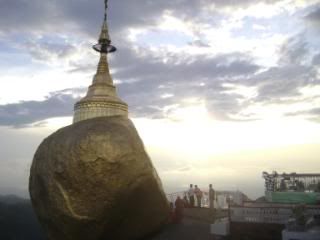
Most people eke out a desparate existence in any way they can. The sidewalks are full of people selling the random fragments of their lives: half used toiletries, dowries and family jewels, fruit culled from garden trees. Girls sell flower wreaths to the few passing motorists who drive rattletrap cars of no discernable make or model. Many live in once comfortable homes now rotting into the red earth. Most get around on foot or by bicycle. Cell phones are practically nonexistant, as are private phones and satellite TV.
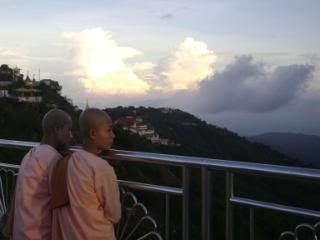
Interesting for a dictatorship, however, is that the government really has little control over people's lives. In fact, the government simply seems oblivious. I think my most enduring aural memory of Yangon, a city of 5 million, will be the sound of twostroke engines. The capital has power for only 6 hours a night, and a few hours during the day.
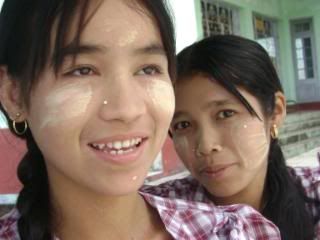
Those who can get by with generators, which hum outside doorways and seem to add to the heat. The evening news is read by a stone cold sober woman standing in front of a picture of a power plant. After the news is a short video karaoke show: the current popular tune was a girl dancing in front of a hydroelectric plant. I'm sure the irony of it all is not lost on residents watching the news courtesy of a diesel generator. (After the news, BTW, is a game show called Puzzle Palace; occasionally the camera pans to show an auditorium devoid of spectators. And after Puzzle Palace is English soccer, relayed off India's Star Sports, played with the volume off so the Burmese announcers can give play by play.)
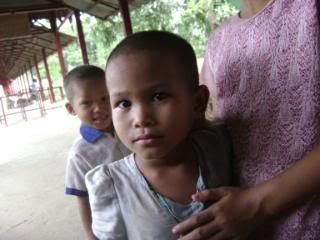
Such absurdities and injustices, however, don't outwardly affected the Burmese. They are quiet, look out for one another, and have the widest smiles in the world. They lead the purest, most innocent lives you can imagine. They listen to transistor radios. They touch each other tenderly when they are talking. They bemoan their plight only in private. Despite living in a rather filthy world they are always freshly dressed. Men and women alike wear long skirts called longyis, which are said to be good for dealing with the heat.
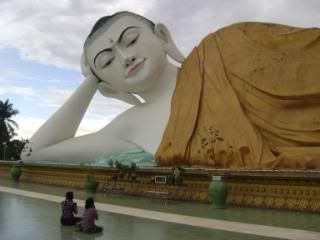
Almost all girls and women, and quite a few boys, wear mud on their faces. The mud acts as an allpurose sunscreen, makeup, perfume and moisturizer. On a handsome boy it is striking. On a pretty girl it is captivating, if not breathtaking.
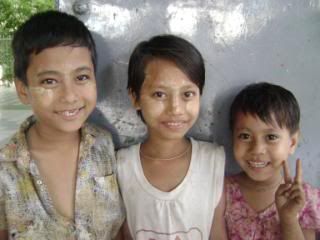
Despite being shy, the Burmese love to talk to you. You can get a good sense for who you are talking to by how they refer to their country. If they say, How do you like Myanmar? you know you are dealing with someone who does not want to talk politics. If they say "Burma" -- the name the nation was called before the junta took over -- you are likely talking to a patriot. One such patriot was the owner of the hotel I stayed at in Yangon. He talked frankly about the country's troubles and his hopes for the future -- namely planned elections in 2010, which are scheduled to introduce democratic representation. He's planned ahead -- with his brother he has purchased 200 acres in Kinpun, and plans a sort of eco-resort. Such a purchase shows great hope in the future, as any land transaction involves hefty bribes and the knowledge the land can be repatriated at any moment. He is not alone in his hope for the future. Several others I talked to spoke of 2010 with hopes for change while keeping a realistic notion that change has been talked about now in Myanmar for a very long time.
(Of course, it's entirely possible that by the time change comes, Myanmar will no longer be the beautiful place it is today, a place where golden temples seem to light the sky and girls wear mud on their faces.)
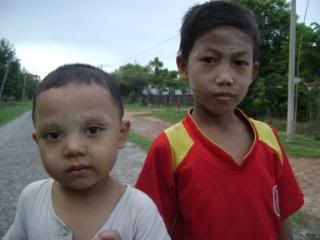
Am I glad I went to Myanmar? Sure. I'm glad I have gone everywhere I have, if only for the knowledge that I don't want to go there again. There are plenty of places I never want to return to -- Peru, Bangladesh, Hungary. Those are places I either grew to loathe or whose benefits were far outweighed by their drawbacks. There are other countries I never want to return to, but for different reasons. One of those was Ethiopia, a country so exhausting and beguiling and beautiful it simply stunned the senses. I don't despise Myanmar because it's ugly. I despise it because I have no way of appreciating its beauty. "This is Burma," wrote Rudyard Kipling. "It is quite unlike anything you have experienced."
Laura stayed in Bangkok for three days before catching a flght via Tokyo for Atlanta. She got a roundtrip in hopes she can rejoin me on June 3. I head for Dubai and Oman on May 23 and return June 1. On June 5 we pick up again our round the world tickets, a complicated set of one way and round trip fares which are not changeable, not refundable and intricately linked. Now in Bangkok I'm airing my things out and restocking on provisions and trying to rest up for the next leg.
2 comments:
Another great story, Jeff. Good luck to you both.
I am sorry to hear about Laura's dad. Tell her that she and her family are in my thoughts at this time. Hope all goes well.
Post a Comment